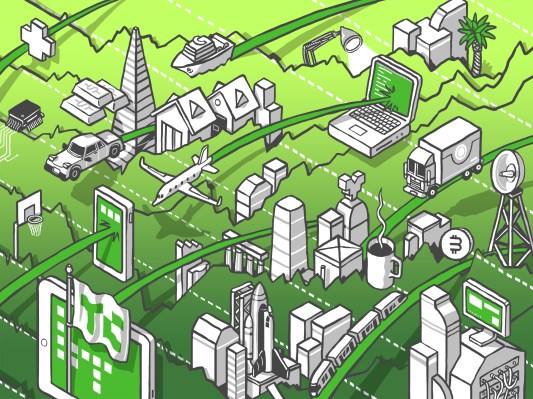I know that TechCrunch is not a publication that talks about labor issues at length. But it turns out that much of the recent discourse in tech is giving rise questions that land outside the core remit of technology itself. Just as geopolitics is increasingly a technology story, as are warfare and youth protections, you can’t talk about tech’s biggest issues without touching upon how they affect the masses.
This is evident in the current writer’s strike in Hollywood, where a large creative body is arguing not only for improved compensation for their work but also for a better fit in the new streaming world.
The Exchange explores startups, markets and money.
Read it every morning on TechCrunch+ or get The Exchange newsletter every Saturday.
 Changes in the entertainment landscape driven by tech (streaming) have impacted how shows and films are monetized, meaning that the prior norms of the relationship between the entertainment business and the people doing the labor also need to change. Writers are putting their pens down to combat what they consider to be an attack on their well-being.
Changes in the entertainment landscape driven by tech (streaming) have impacted how shows and films are monetized, meaning that the prior norms of the relationship between the entertainment business and the people doing the labor also need to change. Writers are putting their pens down to combat what they consider to be an attack on their well-being.
Reading Cory Doctorow on the strike this morning, I was enraptured by this riff:
The way that the studios make money has changed: streaming is clobbering ad-supported TV and movie theater tickets. The studios are adapting. The workers want to adapt, too. [As Hamilton Nolan writes, however,] the studios would rather “[treat] their work force as a disposable natural resource to be mined, used up, and then abandoned, as business dictates.”
A union gives workers “the same ability to adapt to changing industries that companies already have.” The studios want to leave workers behind. Unions give workers the collective power to say, “No. You’re taking us with you.”
The writer’s strike is a bit off topic for TechCrunch, but both the entertainment and technology industries have something in common: The people working inside these industries are going through a period of rapid change driven by technology.
It wasn’t even two years ago when tech companies big and small were hoarding talent, hiring ahead of their needs and bashing their heads in to secure employees and keep certain players out of the hands of competitors. It was a pretty darn good time to work in tech. A lot of folks made a lot of money and managed to wrangle strong benefits for their labor.
But times changed and now a lot of those gains are being clawed back. Layoffs are a pandemic in the technology industry, perks are being curtailed, and some recent changes to the worker-workplace arrangement (remote work) are being undermined.
But unlike in Hollywood, there’s no real tech labor movement. This is partly because tech workers are often told that they are already coddled, and it doesn’t help that some tech workers are concerned that a union would more harm their own compensation than protect their backsides.
I sincerely doubt that the present downturn would be enough to catalyze a tech labor movement given what we’ve seen from the industry in prior downturns. At the same time, we’re on the cusp of something new: The rise of generative AI’s ability to do a portion of a person’s work and, at times, provide a rough facsimile of human output.
This matters for writers in Hollywood, as their bosses would love to stop paying for pensions, healthcare and salaries, and instead pay writers gig fees to edit AI-produced scripts. Thankfully, the writers have the collective ability to decline that possibility.
But what about tech workers when companies want to automate their own labor through AI? How much will it pay to debug generative AI-created code compared to writing it from scratch? Less, I think, or at least less in aggregate. Tech workers are building the companies that will want to make them redundant at worst, or at best, less valuable.
As a capitalist and a fan of creative destruction over a long time horizon, I am modestly sympathetic to companies that want to improve profitability to keep their shareholders happy. But I am a human first and a capitalist second, meaning that I am more sympathetic to protecting the livelihoods of workers during a period of rapid technological and business change.
Hollywood’s writers already had a mechanism in place to rebuff what they consider to be unfair changes to their compensation and employment. Tech workers don’t have that muscle — or at least not enough of it. I am stuck chewing on one question today: How much will traditional tech employment have to be debased before your local libertarian code-wrangler is ready to organize?
Am I being too alarmist? Only if the hype around AI winds up deflating. Perhaps the boom in AI-generated writing and art will sputter and the efficiency gains we’ve seen with LLMs able to code will hit a ceiling. But I wouldn’t bet on it. Tech workers might want to think about how the technologies they are building today will impact their own paychecks in time, if they don’t come up with some way of speaking as a group.
Until then, layoffs will continue until investor morale improves.
